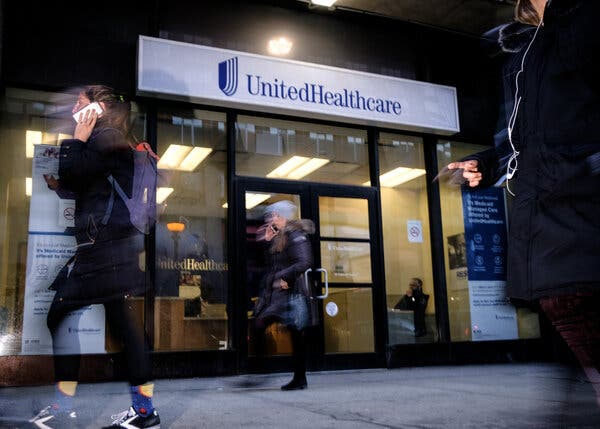I don’t understand the connection w/ USPS, except that I know they collect digital images of every piece of mail and if you use the mail to commit a crime, that escalates the penalties associated to federal crimes.
When the government gets tips and explanations from stakeholders, it does help. Healthcare is too complicated for anybody to understand. They are trying to be accessible.
Our Investigation of UnitedHealth Started With a Tip
A reporter was familiar with the insurance giant under scrutiny and the law firm known for its attack stance. Then one hired the other.
UnitedHealthcare’s parent company, UnitedHealth Group, has been the subject of investigative reporting by numerous outlets.Credit…Christopher Lee for The New York Times
By David Enrich
David Enrich is a deputy investigations editor at The Times. He recently wrote a book about attacks on press freedoms.
July 12, 2025
Times Insider explains who we are and what we do, and delivers behind-the-scenes insights into how our journalism comes together.
The tip arrived in late May: A giant health care company had dispatched a prominent law firm to pressure Amazon to remove an obscure documentary from its video-streaming platform.
This was right in my wheelhouse. I had spent the past few years writing for The New York Times about how rich and powerful people and companies often tried to stop journalists, activists and everyday citizens from scrutinizing or criticizing them. The tactics included sending strongly worded lawyer letters and, in one case, vandalizing journalists’ homes. It was a long-running trend that had accelerated during the Trump era.
One of the focal points of my reporting had been the law firm Clare Locke, a small but ferocious purveyor of threats and lawsuits against news outlets and their sources. The firm’s website boasts of its lawyers’ reputation as “media assassins.”
Now, the tipster informed me, Clare Locke was working on behalf of UnitedHealth Group, a sprawling health care conglomerate, to get Amazon to remove a video that harshly criticized one of UnitedHealth’s subsidiaries.
I had been familiar with UnitedHealth, whose coverage decisions and billing practices have been the subject of investigative reporting by numerous news outlets. Last year, I edited a series of articles about drug industry middlemen known as pharmacy benefit managers, or P.B.M.s. One of the largest P.B.M.s is a subsidiary of UnitedHealth, and the company had not been happy about our coverage. That June, I had a long but civil phone conversation with a UnitedHealth spokesman. No lawyers were involved.
After that, however, the company’s fortunes deteriorated. It was under federal investigation for potential Medicare fraud. Its stock price was sinking. And in December, the chief executive of UnitedHealth’s insurance division was gunned down on his way into a Manhattan hotel. The company’s heightened sensitivity was perhaps understandable.
Even so, I was surprised that it would go to the trouble of writing a 16-page letter complaining about a random video that had been uploaded to Amazon’s streaming service. And I was even more intrigued when, a few days after I got the tip, the video, titled “Modern Medical Mafia,” vanished from the platform.
I contacted Mary Strause, the filmmaker in Wisconsin who had created the video. She told me that it hadn’t only disappeared from Amazon. Another streaming platform, Vimeo, had removed it, too. She shared with me the email she’d received from Vimeo, which said it had taken down the video after UnitedHealth complained that it was defamatory. (The video remains available on YouTube.)
In early June, UnitedHealth went to court in Delaware to sue The Guardian for defamation for a recent article. Such lawsuits are hardly unheard-of, but here was another example of how the health care company and its law firm were playing hardball.


